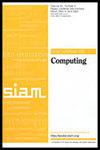Dequantizing the Quantum Singular Value Transformation: Hardness and Applications to Quantum Chemistry and the Quantum PCP Conjecture
IF 1.6
3区 计算机科学
Q3 COMPUTER SCIENCE, THEORY & METHODS
引用次数: 0
Abstract
The Quantum Singular Value Transformation (QSVT) is a recent technique that gives a unified framework to describe most quantum algorithms discovered so far, and may lead to the development of novel quantum algorithms. In this paper we investigate the hardness of classically simulating the QSVT. A recent result by Chia et al. [Sampling-based sublinear low-rank matrix arithmetic framework for dequantizing quantum machine learning, in Proceedings of the 52nd Annual ACM SIGACT Symposium on Theory of Computing (STOC 2020), 2020, pp. 387–400] showed that the QSVT can be efficiently “dequantized” for low-rank matrices, and discussed its implication to quantum machine learning. In this work, motivated by establishing the superiority of quantum algorithms for quantum chemistry and making progress on the quantum PCP conjecture, we focus on the other main class of matrices considered in applications of the QSVT, sparse matrices. We first show how to efficiently “dequantize”, with arbitrarily small constant precision, the QSVT associated with a low-degree polynomial. We apply this technique to design classical algorithms that estimate, with constant precision, the singular values of a sparse matrix. We show, in particular, that a central computational problem considered by quantum algorithms for quantum chemistry (estimating the ground state energy of a local Hamiltonian when given, as an additional input, a state sufficiently close to the ground state) can be solved efficiently with constant precision on a classical computer. As a complementary result, we prove that with inverse-polynomial precision, the same problem becomes -complete. This gives theoretical evidence for the superiority of quantum algorithms for chemistry, and strongly suggests that said superiority stems from the improved precision achievable in the quantum setting. We also discuss how this dequantization technique may help make progress on the central quantum PCP conjecture.量子奇异值变换的脱量子化:硬度及其在量子化学和量子PCP猜想中的应用
量子奇异值变换(QSVT)是一种最新的技术,它提供了一个统一的框架来描述迄今为止发现的大多数量子算法,并可能导致新的量子算法的发展。本文研究了经典模拟QSVT的难度。Chia等人最近的一项研究结果[基于采样的亚线性低秩矩阵算法框架用于去量化量子机器学习,发表在第52届ACM SIGACT计算理论研讨会(STOC 2020), 2020, pp. 387-400]表明,QSVT可以有效地“去量化”低秩矩阵,并讨论了其对量子机器学习的意义。在这项工作中,受量子化学中量子算法的优越性和量子PCP猜想的进展的激励,我们将重点放在QSVT应用中考虑的另一类主要矩阵——稀疏矩阵上。我们首先展示了如何以任意小的常数精度有效地“去量化”与低次多项式相关的QSVT。我们将此技术应用于设计经典算法,以恒定的精度估计稀疏矩阵的奇异值。我们特别表明,量子化学的量子算法所考虑的一个中心计算问题(当给定一个足够接近基态的状态作为额外输入时,估计局部哈密顿量的基态能量)可以在经典计算机上以恒定的精度有效地解决。作为补充结果,我们证明了在逆多项式精度下,同样的问题变为-完备。这为量子算法在化学中的优越性提供了理论证据,并强烈表明,这种优越性源于量子设置中可实现的精度的提高。我们还讨论了这种去量子化技术如何有助于在中心量子PCP猜想上取得进展。
本文章由计算机程序翻译,如有差异,请以英文原文为准。
求助全文
约1分钟内获得全文
求助全文
来源期刊

SIAM Journal on Computing
工程技术-计算机:理论方法
CiteScore
4.60
自引率
0.00%
发文量
68
审稿时长
6-12 weeks
期刊介绍:
The SIAM Journal on Computing aims to provide coverage of the most significant work going on in the mathematical and formal aspects of computer science and nonnumerical computing. Submissions must be clearly written and make a significant technical contribution. Topics include but are not limited to analysis and design of algorithms, algorithmic game theory, data structures, computational complexity, computational algebra, computational aspects of combinatorics and graph theory, computational biology, computational geometry, computational robotics, the mathematical aspects of programming languages, artificial intelligence, computational learning, databases, information retrieval, cryptography, networks, distributed computing, parallel algorithms, and computer architecture.
 求助内容:
求助内容: 应助结果提醒方式:
应助结果提醒方式:


